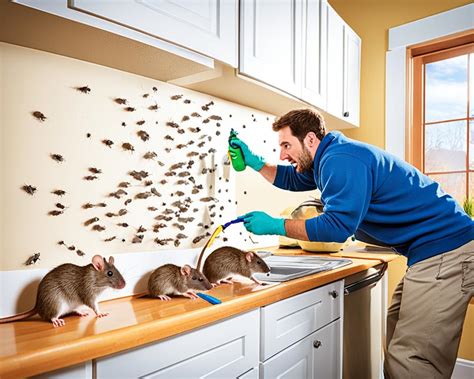Rodents, particularly rats, are known to be cunning and highly adaptable pests that can cause significant damage to property, spread diseases, and contaminate food sources. According to the Centers for Disease Control and Prevention (CDC), rats are responsible for transmitting over 35 diseases to humans, including leptospirosis, hantavirus, and plague. To protect your health and property, it’s crucial to effectively manage and eliminate rat infestations.

1. Exclusion: Sealing Entry Points
The first line of defense against rats is to prevent them from entering your premises in the first place. Inspect your property thoroughly for any cracks, holes, or gaps where rats could sneak in. Seal these entry points with caulk, steel wool, expanding foam, or other suitable materials. Pay particular attention to areas around pipes, cables, and vents.
2. Sanitation: Eliminating Food Sources
Rats are attracted to food sources, so it’s essential to eliminate any potential access to food. Keep your premises clean and tidy, and store food in airtight containers or elevated locations. Remove pet food and water bowls when not in use. Dispose of garbage properly in covered bins and keep compost piles away from your home.
3. Trapping: Humane and Effective
Trapping rats can be an effective method of eliminating infestations. Use snap traps or live traps baited with peanut butter, cheese, or bacon. Place traps along walls, in corners, and near potential entry points. Regularly check traps and dispose of caught rats humanely.
4. Poisoning: A Last Resort
Poisoning should only be considered as a last resort when other methods have failed. Use rodenticides according to the manufacturer’s instructions and follow all safety precautions. Place poison bait stations in areas where rats are known to congregate, but keep them away from pets and children.
5. Ultrasonic Devices: Mixed Results
Ultrasonic devices emit high-frequency sounds that are said to deter rats. However, scientific evidence regarding their effectiveness is mixed. Some studies suggest that they may provide temporary relief, while others indicate that rats can adapt to the sounds over time.
6. Natural Repellents: Limited Success
Certain natural scents, such as peppermint oil, cinnamon, and cayenne pepper, are said to repel rats. While these repellents may provide a temporary deterrent, they are not always effective and should not be relied upon as a primary rat control measure.
7. Professional Pest Control: Guaranteed Results
If all else fails, contact a professional pest control company. They have the expertise, equipment, and licensed rodenticides to eliminate rat infestations quickly and effectively. Professional pest control services often offer a guarantee of their work, providing peace of mind and ensuring long-term protection.
Tips and Tricks
- Inspect your property regularly: Check for signs of rat activity, such as droppings, gnaw marks, or grease stains.
- Use multiple methods simultaneously: Combine different strategies, such as sealing entry points, eliminating food sources, and trapping, to increase your chances of success.
- Be patient and persistent: Rat infestations can take time to eliminate. Don’t give up if you don’t see immediate results; continue with your efforts consistently.
- Consider cultural practices: Some cultures have traditional methods of rat control that may be effective in specific circumstances.
Pros and Cons
| Method | Pros | Cons |
|---|---|---|
| Exclusion | Prevents rats from entering | Can be time-consuming and costly |
| Sanitation | Eliminates food sources | May not be effective against all rats |
| Trapping | Humane and targeted | Requires ongoing monitoring |
| Poisoning | Fast and effective | Can be dangerous for pets and children |
| Ultrasonic Devices | Non-toxic and chemical-free | Mixed results; may not be effective over time |
| Natural Repellents | Limited effectiveness | May not deter all rats |
| Professional Pest Control | Guaranteed results; no DIY required | Can be more expensive |
FAQs
1. What diseases can rats transmit to humans?
– Leptospirosis, hantavirus, plague, and others
2. How can I identify rat droppings?
– Dark brown or black, cylindrical, and pointed at one or both ends
3. Is it safe to use rat poison around pets and children?
– No, rat poison can be highly toxic and should only be used with extreme caution
4. How long does it take to eliminate a rat infestation?
– The time frame depends on the severity of the infestation and the methods used
5. What are some natural ways to deter rats?
– Peppermint oil, cinnamon, and cayenne pepper have some repellent effects
6. Should I call a professional pest control company to handle rat infestations?
– Yes, professional pest control services can provide guaranteed results and peace of mind












